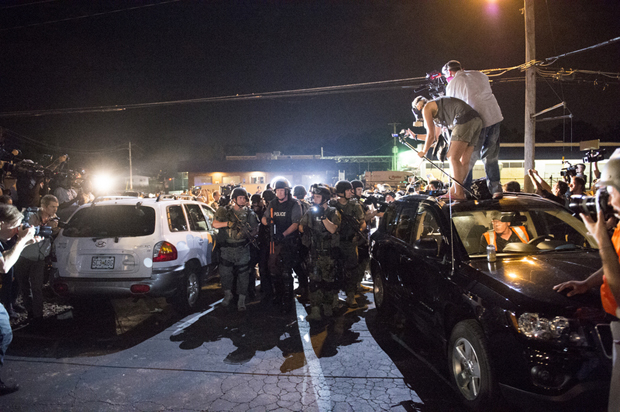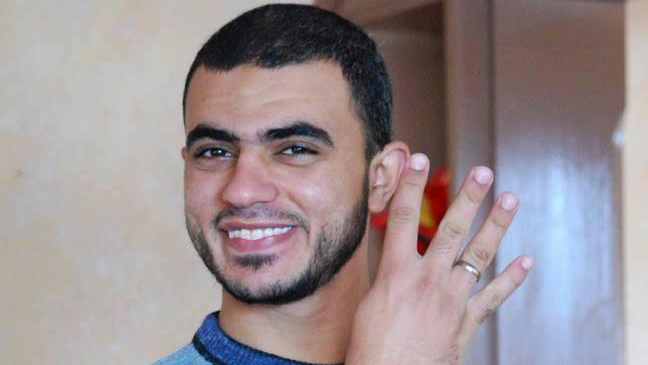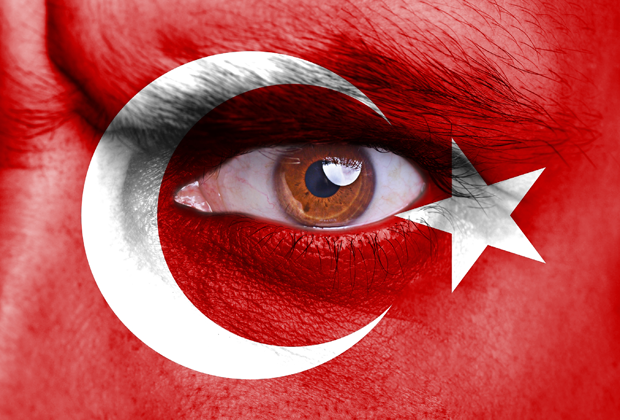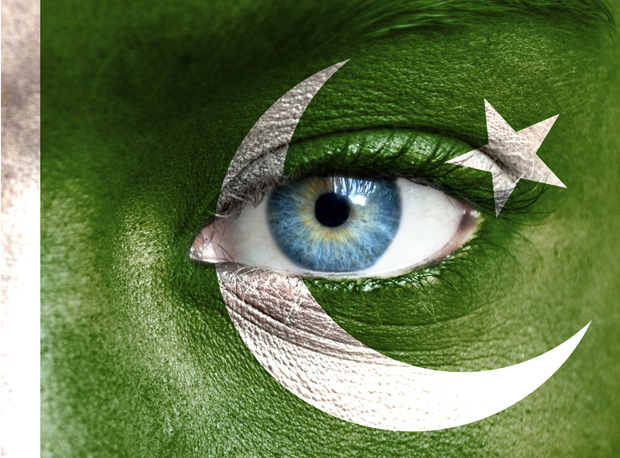21 Aug 2014 | Americas, News, United States

A number of journalists have been arrested while covering the protests in Ferguson, Missouri (Photo: Abe Van Dyke/Demotix)
As news spread of a video showing the murder of American journalist James Foley by the Islamic State (ISIS), journalists and Middle East watchers were unanimous on social media: do not watch the film. And for God’s sake do not post links to the film anywhere. Do not give the killers what they want.
The descriptions were brutal enough. They echoed back over a decade, to the murder of Daniel Pearl by Al Qaeda linked terrorists in Pakistan 2001.
There is a very specific message in the public execution of journalists. It’s a hallmark of extremism, in that it signifies that your movement is far beyond attempting to use the press to “get the message out”, to garner support. This is not about rational grievances the international community could address. This is not about convincing anyone who isn’t already open to your ideas. It’s about rejecting traditional ideas under which the press operates.
But this is partly possible because the likes of ISIS no longer need the attention of press to reach the world. Much has been made of the group’s social media presence. It’s genuinely impressive, and, importantly, clearly the work of people who have grown up with the web; people who are used to videos, Instagram, sharable content. They are, to use that dreaded phrase, “digital natives”. They understand the symbolic power of murdering a journalist, but they see themselves as the ones in charge of controlling the message.
Media workers are increasingly targeted, while the previous privileges they enjoyed fade away.
As I sat down to write this column, the number of journalists arrested while covering disturbances in Ferguson, Missouri stands at 17. According to the Freedom of the Press Foundation, this number includes reporters working for German and UK outfits, as well as domestic American media.
Journalists have apparently been threatened with mace. An Al Jazeera crew had guns pointed at them and their equipment dismantled. A correspondent for Vice had his press badge ripped off him by a policeman who told him it was meaningless (in slightly coarser language).
The Ferguson story is a catalogue of things gone wrong: racism, disenfranchisement, the proliferation of firearms, a militarised police force (a concept that goes far beyond mere weaponry; this is law enforcement as occupying force rather than as part of a balanced democracy). To single out the treatment of media workers may seem a little self serving, but there is good reason to do so.
We are used to telling ourselves by now that journalism is a manifestation of a human right — that of free expression. Smartphones, cheap recording equipment, and free access to social media and blogging platforms have revolutionised journalism; the means of production have fallen into the hands of the many.
This is a good thing. The more information we have on events, surely the better. But one question does arise: if we are all journalists now, what happens to the privileges journalists used to claim?
Official press identification in the UK states that the holder is recognised by police as a “bona fide newsgatherer”. As statements of status go, it seems a paltry thing. But it does imply that some exception must be made for the bearer. The recognised journalist, it is suggested, should be free to roam a scene unmolested. One can ask questions and reasonably expect an answer. One can wield a video or audio device and not have it confiscated. One can talk to whoever one wants, without fear of recrimination.
That, at least, is the theory. But in Britain, the US and elsewhere, the practice has been changing. Whether during periods of unrest or after, police have shown a disregard for the integrity of journalists’ work. The actions of police in Ferguson have merely been part of a pattern.
The question is whether we can maintain the idea of journalistic privilege when everyone is a potential journalist.
During the legal tussles over the case of David Miranda, the partner of former Guardian writer Glenn Greenwald, an attempt was made to identify persons engaged in journalistic activity, without necessarily being employed as journalists.
Miranda was detained and searched at Heathrow airport as he was believed to have been carrying files related to Edward Snowden’s NSA leaks, with a view to publication in the Guardian, though he is not actually a journalist himself.
The suggestion made by Miranda’s supporters (Index on Censorship included) is that the activity of journalism is what is recognised, rather than the journalist.
This may be applicable in circumstances such as a border search, but how would it apply in the heat of the moment in somewhere like Ferguson, or during the London riots, or any of the recent upheavals where citizen footage has proliferated. If someone starts recording a confrontation with the authorities, are they immediately engaged in journalistic activity? Or does journalism depend on what happens to your video, your pictures, your tweets?
When everyone is a journalist, is anyone?
This article was posted on August 21, 2014 at indexoncensorship.org
12 Aug 2014 | Israel, News, Palestine, Politics and Society

Khaled Hamad was killed while reporting on the Gaza conflict.
News coverage of the ongoing Gaza conflict would be infinitely poorer without local journalists, but it’s clear that international media needs to show their commitment by providing Palestinian reporters and fixers with extra support.
Images of bloodied press vests have become a dark motif of the latest Gaza war. One of the most striking came from 22-year-old photographer Rami Rayan, killed during the shelling of a market in the Shujayah district on the 30 July. The same attack also killed journalist Sameh al-Aryan, aged 26. Before this came the pictures of Khaled Hamed, pulled from the rubble of Shujayah with his broken video camera at his side on the 20 July. In total, 13 Palestinian journalists have been killed in over a month of fighting, according to the International Federation of Journalists.
An earlier statement by the IFJ also listed the names of seven journalists who had been injured when they were struck by shrapnel, with six of these injuries occurring while the journalists were in the field. The seventh was injured when her house was destroyed by an Israeli bombardment.
A journalist’s bullet-proof vest does more than just physically protect the wearer – the “PRESS” marking it is designed to show that they are never a legitimate target. This should stand apart from even the high civilian death toll of this war. Marking oneself as a journalist is to appeal to the so-called “rules of engagement”, that attacking journalists or anywhere where there may be journalists, is a breach of a code that has, until now, lasted since journalists first took to the battlefields to report.
In Gaza, this code has sadly long since worn thin. Hamid Shehab was killed when his parked car was struck by a rocket outside his house on the 9 July. According to the IFJ, his car was “clearly marked as a press vehicle”.
There is no doubt that covering this war has taken its toll on every journalist that has operated in Gaza since fighting began on the 8 July. But sadly, the body count suggests that the dangers for Palestinian media workers covering their homeland in a time of crisis, and those for international journalists who enter to cover the war, are distinctly different. Palestinian media workers include those working for international or local outlets, as well as those working as fixers for international media. The role of a fixer is one that is often overlooked – especially in terms of safety.
In a statement on the 6 August, the Israeli Government Press Office (GPO) stated that they had issued accreditation to 705 journalists from over 42 countries. This is not necessarily the number of journalists who entered Gaza to cover the war, but a GPO card is needed to do so. If even half of this number succeeded to enter and leave Gaza without coming to any harm, they still compare favourably to the numbers of Palestinian media workers who have been harmed.
The Israeli Defense Force (IDF) have taken a certain amount of care to protect international journalists operating on the ground in Gaza, at one point relocating them to two hotels in the strip in order to provide a level of protection during a period of particularly heavy shelling. Although fixers or other Palestinian media workers were free to shelter alongside the international press in the lobby of these hotels, the journey alone may have proved lethal. Add to this that Gazan journalists are unlikely to choose to leave their families at home to suffer heavy shelling while they themselves enjoy this nominal protection.
Even with the IDF awareness of media workers the offices of Al Aqsa TV and Radio, Wattan Radio and the National Media agency were destroyed, and workers at Al Jazeera’s office in Gaza city were forced to evacuate following “warning shots” fired at the building. This occurred days after Al Jazeera was threatened by Israeli Foreign Minister Avigdor Lieberman, who stated at a press conference on 21 July that the foreign ministry was taking steps to investigate the network, with “the intent of not allowing it to broadcast anymore from Israel”.
A tentative ceasefire is currently allowing some respite on the ground in Gaza. But many of the journalists who have left the strip have said that this is not the last war they expect to cover there. Sadly, this is also not the first time that attacks on media outlets have been part of wider attacks on Gaza.
The deaths of Palestinian journalists was also a feature of the 2012 war, when three journalists were killed. One of the most hotly-debated points of this latest bout of destruction has been what constitutes a “legitimate target”. There is one lesson that must stand apart from this discussion: no journalist should ever be included in that category.
The following are statements from fixers and journalists who have been involved in covering Gaza.
In the case of Gaza, nobody is safe. As a fixer I am more exposed to dangers because of continuous movement to the “hot zones”. Last Friday, during the ceasefire, I was 100m away from the front line with the Israeli army in Beit Hanoun. I don’t have equipment for protecting myself like a flak jacket or helmet – my movement from my house to the hotels [where journalists stay] adds more risk. We depend on marking our car with words like TV, hoping that the Israelis will avoid us. What normally privileges foreign journalists over local ones is their financial capabilities.”
— Amjed Tantish is from Beit Lahia, in the north Gaza strip.
Moving around under constant shelling, I wasn’t sure if I would make it back home. I couldn’t get a bulletproof vest, as they are so expensive and I’m a freelancer – I can’t afford it. But also, there is no one who would volunteer to bring one into Gaza from Jerusalem for me. Working without it is risky though. Another danger to Palestinians is that they can be accused of being pro-Israeli. Internationals can come and go, but Palestinians will point fingers at me if I write something they don’t like. I wish that there was an organization that was protecting Palestinian journalists – but as a freelancer, I am responsible for my life. International outlets should take into account that the dangers faced by the local journalists they hire may be quite different – but that should apply to all conflict zones, not just Gaza.”
— Abeer Ayyoub, freelance journalist, Gaza City.
I am usually lucky to find an available flak jacket. Usually I don’t wear protective gear- I would like to buy some, but they are expensive and hard to get during wartime. Instead, I try and assess whether the situation is safe enough to be in, and if it seems too dangerous, I leave. I call ahead to people in the area to see if it’s safe, to find out what the safest route is and to coordinate with people on the ground. For sure, I could get killed. I feel like I could lose everything sometimes. But it’s my work, it’s what I do to get the message out to the world. Some of the people I work with appreciate the work and the risk, but 80 percent don’t care about the risks we take. Most people don’t know about what we do for them. They don’t think about us dying for a picture they sell for $50.”
— Mohammed Rajab, a fixer based in Gaza City.
Danger in this war is everywhere- nowhere is safe. You could survive the hardest hit places, and die in places you think are the safest. I thought that heading to church to do story on displaced families is safe. The next day, it was bombed. Palestinian journalists face different dangers to international journalists – there is a form of discrimination among Gaza-based news agencies. Local staff don’t dare to speak out on this, but if there is a bulletproof car, then international staff have priority to drive it. International journalists are protected by insurance and an affiliation to international and national journalists unions. This gives them protection and insurances if something goes wrong. In Gaza, if a journalist is killed, media outlets cannot care less about their families. Some news agencies know Palestinian journalists well enough in crises, but after the war ends, they dump them. It’s hard for journalists to make themselves indispensible. The outlets I have freelanced for do understand the limitations – but I’ve heard of others that seem to think you could get close enough to danger to hold a rocket in your hands, i.e. get exclusive shots. A friend of mine was injured and his outlet dumped him to find someone new, exactly like you do with car spare parts.”
— Mohammed Omer, a freelance journalist based in Rafah
Israeli forces will open fire on Palestinians, but not internationals. Internationals are just less likely to be shot at – I make sure I wear a bulletproof vest and a helmet, and make sure that I’m clearly marked as press. We need this protective gear. The vest and helmet cost me $1000- and there is no compensation for hazards, even when I work for international media outlets. If you are a Palestinian national that means no insurance either. Foreign journalists at least have the chance of getting their media outlets to cover their life insurance or provide compensation.”
— Yousef Al-Helou, a journalist who covered the two previous wars in Gaza, currently in London
This article was published on August 12, 2014 at indexoncensorship.org
1 Aug 2014 | Mapping Media Freedom, News, Politics and Society, Turkey

Photo illustration: Shutterstock
Since the beginning of this year, cases of assault against journalists, legal threats and lay offs worsened Turkey’s already precarious state of press freedom.
In May, Freedom House ranked Turkey’s media climate “not free.” The Istanbul-based non-profit news website Bianet publishes quarterly media monitoring reports on press freedom breaches within Turkey. Along with new fines against media outlets and other ominous restrictions, the most recent report shows that physical assault against journalists increased over the last three months. According to the new report, 54 journalists were victims of assault between April and June. Bianet’s previous report documents “at least” 40 accounts between January and March.
Erol Önderoğlu, author of Bianet’s media reports, attributes the increased number of assaults this spring to recent demonstrations where journalists were injured. This May, protestors commemorated the first anniversary of the Gezi Park demonstrations, just a few weeks after large protests took place on May 1. Önderoğlu says police and other security officers are more prone to use violence at protests. “They think they have the right to exert a certain violence against demonstrators,” he says. Önderoğlu sees last year’s Gezi Park protests as a turning point for this kind of aggression towards journalists at demonstrations. Since then, Önderoğlu says, police officers became the main source of violent assault against journalists.
At May 1 protests in Istanbul, at least twelve journalists were injured while reporting. One editor for the news website t24 was detained by police for hours. Violence against journalists erupted again during the Gezi commemorations this year. While reporting live from the protests, CNN correspondent Ivan Watson was harassed by plainclothes security officers who demanded to see his passport. Watson and his crew were then detained and Watson tweeted that he was kneed while in police custody.
Many journalists don’t file legal complaints after they’ve been assaulted. According to Önderoğlu, especially journalists working for mainstream news outlets feel their own jobs may be threatened if they speak out against police. “They have this feeling that by condemning civil servants and police officers for using force, they are in a way putting the board and the directors of their own media organization in a bad position,” Önderoğlu says, adding that because of the lack of editorial independence in Turkey, conflicts with government can lead to journalists being fired. Earlier this year, the extent of Prime Minister Erdoğan’s influence over some media organizations was revealed by leaked phone conversations between Erdoğan and the owners of media outlets, including the newspaper Milliyet and broadcaster Habertürk.
The journalists Ahmet Şık, Onur Erem and Ender Ergün did file a complaint over abuse of authority after being assaulted during the 2013 Gezi Park protests. Six months later, their cases were rejected by an Istanbul prosecutor. Bianet reported that 153 journalists were injured during the Gezi Park protests. There still has not been an investigation into those injuries, and Önderoğlu sees the rejection of Şık, Erem and Ergün’s cases as a bad precedent for assaulted journalists seeking justice. “We need not only the stop of police aggression,” Önderoğlu says, “but also the end of impunity against policemen of such accusations.”
More reports from Turkey via mediafreedom.ushahidi.com:
Turkey: Broadcaster threatens to stop covering presidential candidate
Turkey: Physical assaults on journalists increase
Turkey: Media monitoring agency revokes license for Germany-based broadcaster
Turkey: Constitutional Court rules investigation into Hrant Dink’s assassination violated family’s rights
Turkey: Prime Minister files legal complainst against newspaper editor
This article was posted on August 1, 2014 at indexoncensorship.org
29 Jul 2014 | Asia and Pacific, News, Pakistan

(Image: Aleksandar Mijatovic/Shutterstock)
In March, Pakistani columnist Raza Rumi was injured in a gun attack that killed his driver. Weeks later, Hamid Mir, star journalist of Geo TV, Pakistan’s biggest TV station, was shot six times. Luckily, both survived, and managed to avoid becoming part of a bleak statistic: Since 1992, 30 journalists have been murdered in Pakistan; 28 with impunity.
Against this backdrop, a group of experts on Pakistan and its media came together, under the auspices of the Commonwealth Journalists Association and the Institute of Commonwealth Studies at the University of London to discuss the threats facing the country’s journalists. In a discussion chaired by BBC presenter Owen Bennett Jones, former High Commissioner of Pakistan Wajid Shamsul Hasan, Kiran Hassan of the International Institute of Strategic Studies, BBC Urdu Service Editor Aamer Ahmed Khan, New York Times Pakistan Bureau Chief Declan Walsh and renowned journalist and author Babar Ayaz tried to answer the question, How safe is it to be a journalist in Pakistan?
Censorship in Pakistan used to be straightforward, explained Khan. Certain topics were simply off limits. Today, the situation is more complicated and more confusing. Threats to journalists and press freedom take many different shapes, and come from many different sources, including the government, extremists like the Taliban, the intelligence service ISI and powerful media owners.
There are currently 84 different cases against Geo TV, of which 53 are over blasphemy. You cannot defend yourself against that, said Khan. Ayaz raised a similar point when arguing that extremists are the biggest threat to the media. The government might put a person in jail, but these extremist groups will kill for their beliefs, Ayaz said.
While Geo TV and ISI have long been fighting behind closed doors, the case of Hamid Mir created an “open battlefield”, explained Walsh, who was expelled from Pakistan in May 2013. The station aired reports linking the security services to the attack.
Walsh also brought up the ownership issue within the Pakistani television landscape, which he says has gone from “zero to 100” in the past few years. The country today boasts some 90 TV stations. Editorial control remains with media owners, according to Hassan.
But even journalists themselves did not escape criticism. Sections of the media are responsible for the current situation through irresponsible reporting, said Hasan. Quite a few were “playing with fire” by earlier glorifying the Taliban as peacemakers, he explained. Khan also highlighted corruption within the media as a “novel form of censorship”. However, as Khan pointed out, it is difficult for the Pakistani media to be responsible, without enabling them to be responsible. Most of the information that effects people’s lives is under strict control by authorities, he said.
Hassan, however, argued that there has been some progress. Journalists, and by extension the threats they face, are more visible and garner more attention today. She also pointed out that despite part closures, all Pakistan’s TV stations are still running. There was some talk of the role of media regulation in improving the situation, and Hassan said she had hopes for Pembra, the Pakistan Electronic Media Regularity Authority.
Yet, the overall conclusion was that Pakistan is not a safe place to be a journalist — illustrated well by Walsh explaining how, for the first time since he’s covered Pakistan, The New York Times recently had to use a pseudonym to protect their reporter on the ground.
Hasan summed it up: “The establishment doesn’t want the media to be as free as it can be.”
This article was published on July 29, 2014 at indexoncensorship.org




